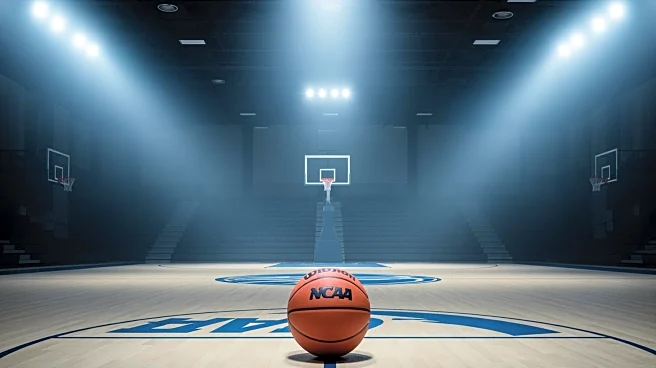What's Happening?
Bill Self, the Kansas basketball coach, expressed his concerns about the NCAA's updated eligibility guidelines that allow NBA G-League players to enter the transfer portal and apply for college basketball eligibility. Speaking at the Big 12 basketball media
days in Kansas City, Self admitted to not fully understanding the rule and its implications, but he anticipates unintended consequences. His comments come shortly after Louisville secured a commitment from London Johnson, a three-year G-League guard, marking a shift in college basketball recruitment strategies. Self, along with other prominent coaches like Tom Izzo and Kelvin Sampson, is grappling with the potential impact of this rule on traditional recruitment practices.
Why It's Important?
The NCAA's decision to allow G-League players eligibility in college basketball could significantly alter recruitment dynamics, potentially prioritizing professional league players over high school recruits. This shift may impact the development of young athletes and the traditional college basketball pipeline. Coaches like Bill Self are concerned about the long-term effects, including the possibility of increased competition for G-League talent and the need to adapt recruitment strategies. The rule could also lead to a reevaluation of eligibility criteria, affecting how teams build their rosters and manage player development.
What's Next?
As the NCAA's eligibility rule takes effect, college basketball programs may need to adjust their recruitment strategies, focusing more on scouting G-League players. Coaches and teams will likely seek clarity on the rule's specifics, including eligibility timelines and conditions. The potential for increased G-League player presence in college basketball could prompt discussions among NCAA officials, coaches, and stakeholders about the future of college sports recruitment and the balance between professional and amateur pathways.
Beyond the Headlines
The inclusion of G-League players in college basketball raises ethical questions about the commercialization of college sports and the impact on amateur athletes. It challenges the traditional notion of college sports as a developmental stage for young athletes, potentially prioritizing professional experience over educational opportunities. This development could lead to broader discussions about the role of college sports in athlete development and the influence of professional leagues on amateur sports.














